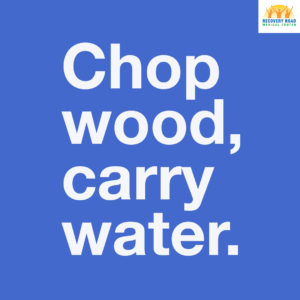
Layman Pang, a Buddhist in the Zen tradition who lived from 740–808, is attributed to this koan which we find describes the best way to approach life in recovery quite well.
Being a Zen koan, “Chop wood, carry water” can have a few interpretations. When it comes to gaining a bit of time in recovery, it may appear that nothing has changed from the outside. What we are doing may look the same and there may not be a visible difference to how others see what we do. We are waking up in the morning, going to work, spending time with family, exercising, hanging out with friends, etc.
The “doing” aspect of our daily lives, however, is in great contrast to what has changed on the inside. This part has to do with “being” and reflects how we relate to others and project less emphasis on ourselves and our own needs. We show empathy, we have compassion and put ourselves in another person’s shoes where we might not have really given it a second thought before due to our addiction.
We find that people in recovery do best when they keep things simple and chop wood, carry water. We do better with a schedule of taking healthy actions during the day of eating right, exercising and doing some form of meditation. Ironically, we don’t find it limiting to keep our lives as simple as possible because, for many of us, our lives were not manageable before.
Here's the entire story generally attributed to the Buddhist monk Wu Li:
"A young boy became a monk. He dreamed of enlightenment and learning great things. When he got to the monastery he was told that each morning he had to chop wood for the monk's fires and then carry water up to the monastery for ablutions and the kitchen. He attended prayers and meditation, but the teaching he was given was rather sparse."
